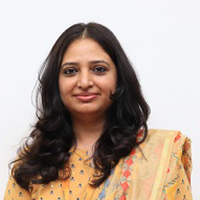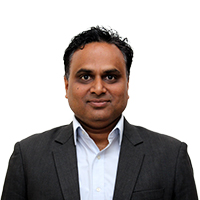OVERVIEW
Computing is rapidly evolving and is integrated into every phase of business, science, engineering, medicine, and everyday life. School of Computer Science and Engineering serve the needs of the private and public sectors for highly qualified computing professionals with a high-quality computer science education that enables them to make big strides in their careers. Students are prepared to meet the ever-increasing technological and social challenges with traditional self-discipline, hard work, all-around personality development and a creative approach to problem-solving.
We also promote and nurture the spirit of innovation and entrepreneurship among students from the first semester itself, to enable them, not only to be industry-ready but also to be job creators, not just job seekers. To this end, we have collaborations with leading IT industries like Dell, Microsoft, EMC2, Oracle, Nvidia, Intel, TI, ARM, VMware, EC Council, etc. The School also provides ample opportunity and encouragement to its students to participate in various sports and other extra and co-curricular activities, to help them develop a well-balanced personality.
ABOUT THE SCHOOL
School of Computer Science and Engineering comprising of the following two departments: Department of Computer Science and Engineering and Department of Artificial Intelligence and Machine Learning, is committed to providing a unique environment for the holistic growth of students, under the able guidance of experienced and committed faculty members.
The school is well-equipped with state-of-the-art laboratories and research facilities. Students acquire creative, innovative, entrepreneurial and technological skills, which are required to make their profession industry ready.
The school attracts high-quality students from all over India and abroad and has an impressive placement record.
The school offers the following programs:
- B.Tech - Computer Science and Engineering
- B.Tech - Computer Science and Engineering (Artificial Intelligence & Machine Learning)
- M.Tech - Computer Science and Engineering (Artificial Intelligence and Machine Learning)
The school is having collaborations with leading IT industries such as Amazon, Cisco, Dell, EC Council, IBM, Microsoft, Oracle, RedHat, VMware, etc which enable students to participate in their flagship events and solicit prestigious internships and placements in Fortune 500 companies.
CORE COMPETENCIES
- Project-Based Learning (PBL) offers the students to develop their problem-solving abilities and enhance their skills for applying classroom learning. Introducing Matlab for Engineering, IoT Fab lab in the first-year curriculum.
- State-of-the-art Computing Labs High computing labs powered by NVIDIA graphics cards with GPUs (RTX3080), Deep learning Labs, and applied artificial intelligence labs with high-end configurations are being installed in department labs.
- Industry Expert Courses (IEC) Selected few Program Electives will be jointly developed by FOE faculty and industry experts, introducing the latest learnings from the industry. In these courses, one or more industry experts may conduct a significant portion of the course.
- Global Exposure to Students MoU signed with leading industries and academia to facilitate students with state of art technologies and to make them industry-ready. The Directorate of International Collaborations (DoIC) also facilitates collaborations and partnerships with institutions globally for academic strategies, Student Exchange Programs, Semester Abroad programs (SAP), student mobility (short or long term), and higher education opportunities.
- Interdicipline Curriculum Students have the option to choose courses as program electives based on their interests. These program electives are either from the computing or non-computing domain.
- Flexi Core (FC) Courses: Core Courses based on emerging trends in the field. Students can select three FCs (4Cr each) from options offered during the fourth, fifth or sixth semester
- Holistic Development of Students: Music, Literature, and Dramatics Clubs facilitate students to show their prowess in the cultural arena, under the able guidance of expert faculty. Technical Clubs like Robotics Club, IEEE Students’ chapter, IE(I) and ICEIT chapters, etc. allow the students to learn and update themselves with the latest technologies and showcase their abilities in various fields, outside their scope of study.
- Self-Study Courses; Problem-Based Learning; Research Innovation and Entrepreneurship: These courses offered in the third through sixth semesters offer students an opportunity to enhance their academic curricula by learning new skills, taking online classes, conducting guided research projects or developing innovative solutions to societal problems.
- Placements: Placements assistance (Mock Drives/Interviews), Internships Assistance, and Placement classes by the expert team of Training and Placement.
LABORATORIES
The School have state-of-the-art laboratories, as given below:·
- Data Structures & Algorithms Lab: Provides the requisite environment for design and analysis of algorithms for solving complex problems in the field of computer science.
- Software Design Lab: The aim of Software Engineering Lab is to impart state-of-the-art knowledge on Software Engineering and UML. The subject will introduce the concept of Software development life cycle. Student will learn Selenium and other tools.
- Database and Oracle Lab: To impart the students with the knowledge on the database management systems, design models, Normalization, Transaction management and Oracle in Creation and maintenance of databases.
- CISCO Network Lab: Cisco Modeling Labs is a scalable and extensible software platform for designing, simulating, and testing network models.
- Parallel Programming Lab: This Lab is used to develop technology that improves performance of parallel applications using CUDA while also improving programmer productivity using hetrogenious parallel programming (CPU+GPU).
- Cyber Security Lab (Accredited Training Centre of EC Council): This is a cloud-based subscription service offered by the EC Council, and it was developed with the intention of providing genuine hands-on practise for information security professionals.
- Applied Artificial Intelligence Lab: The Applied AI Lab (A2I) explores core challenges in AI and Machine Learning to enable robots to robustly and effectively operate in complex, real-world environments.
- Deep Learning Lab: The purpose of Deep Learning Labs is to inspire and motivate tech talent to create solutions with the use of deep learning and reinforcement learning.
- Embedded Systems Lab: Microprocessors and Embedded Systems Laboratory provides students with hands-on experience with building, programming, testing, and debugging processor based systems.anubha madam
- VMware Lab: We have five Dell T440 servers that support virtualization. This lab is used for demonstrated how cloud infrastructure is build using virtualization. We have Centre of Excellence for VMware IT Academy, as academic partnership with industry.
- Central Computing Lab: The objective of this lab is to learn students visualization of data using MATLAB software. Along with this, students can perform hands-on practical experience in various domains. This lab has 120 systems with a good configuration record.
DEPARTMENT LIST
School of Computer Science and Engineering comprising of the following two departments:
- Department of Computer Science and Engineering
- Department of Artificial Intelligence and Machine Learning
INDUSTRY COLLABORATION
To prepare students profession and industry ready, the department is having collaborations with the following renowned IT industries:
- VM Ware IT Academy
- Microsoft Imagine Academy
- Dell Technologies
- CISCO Network Academy
- Secure Meters
- IBM Academy
- Oracle Academy
- RedHat Academy
- PWC Academy
- Celebal Technologies
CAREER OPPORTUNITIES
- Data Analyst- Data analysis is the process of gleaning insights from data to inform better business decisions.
- Software Developer- Create and oversee software used in network distribution, along with database, game, and web development.
- Network Security Manager- Professional who carries out the task of managing the security of a computer network, working individually or as part of a team.
- Cyber Security Analyst- A cybersecurity analyst is a trained cyber professional who specializes in network and IT infrastructure security.
- Database Designer & Manager- The database designer is responsible for defining the detailed database design, including tables, indexes, views, constraints, triggers, stored procedures, and other database-specific constructs needed to store, retrieve, and delete persistent objects.
- Computer Scientist- A computer scientist is an individual who uses expert technical knowledge like utilizing data, developing new software, and analysing trends to create solutions for organizations.
- Full-Stack Developer- A full stack web developer is a person who can develop both client and server software.
- Data Scientist- A data scientist uses data to understand and explain the phenomena around them, and help organizations make better decisions.
- Business Intelligence (BI) Developer- A business intelligence developer oversees generating, organizing, and maintaining business interfaces.
- Machine Learning Engineer - Design, develop and implement ML algorithms.
- Data Engineer - Design and build scalable data processing systems and pipelines.
- AI Software Engineer - Develop software applications that incorporate AI technologies.
- AI DevOps Engineer - Manage the deployment, scaling, and maintenance of AI systems.



















